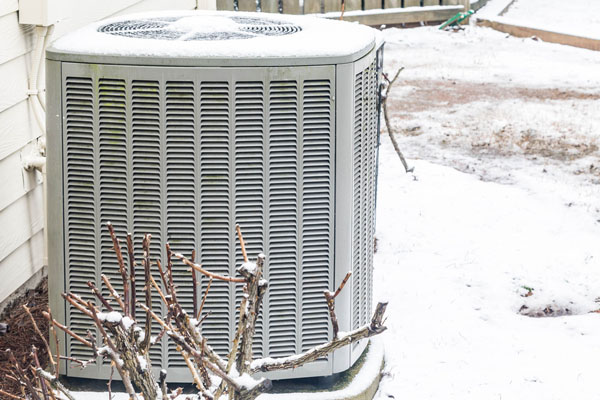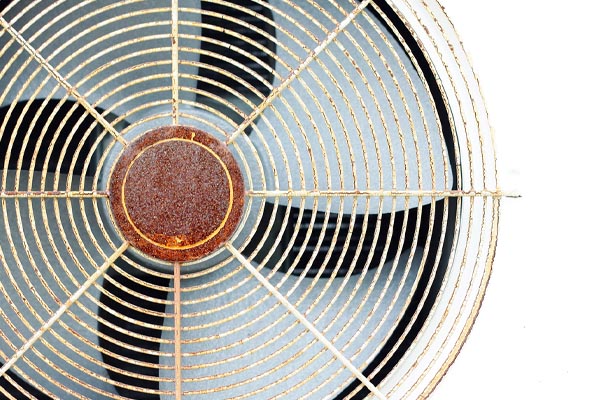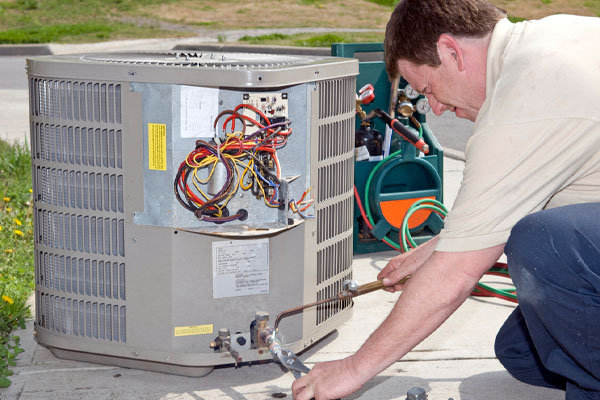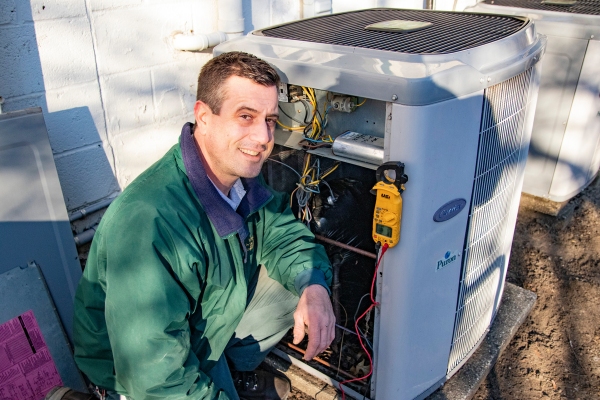Air Conditioner Covers: Do They Really Protect Your Unit?

As winter approaches, you should identify areas of your home that require winterization. In general, the process of winterization involves everything from cleaning gutters, scheduling professional HVAC maintenance with experts like McAllister Energy, to insulating outdoor faucets.
While taking measures to prepare your home for winter, you should pay particular attention to your air conditioning unit because it will determine your indoor comfort levels when the weather warms up once again. Many homeowners ask us whether or not they should use an air conditioner cover. In this article, we discuss more on this topic.
Expert HVAC Service You Can Trust: Choose McAllister Energy for professional installations, repairs, and ongoing system care. Reach out now!
Does My Air Conditioning Unit Need a Cover in the Winter?
Contents
- 1 Does My Air Conditioning Unit Need a Cover in the Winter?
- 2 Other Ways to Safeguard Your HVAC System
- 3 Air Conditioner Cover FAQs
- 3.1 Should I Cover My AC Unit If It’s Directly Under Trees?
- 3.2 Can A Covered Cooling System Lead To Higher Repair Costs In The Spring?
- 3.3 What Are Some Signs Of Air Conditioner Moisture Damage To Look Out For?
- 3.4 How Often Should I Check On My Air Conditioning Unit During The Winter?
- 3.5 Do A/C Units Need Winter Protection At All?
- 3.6 Conclusion
- 4 Call McAllister Energy For Superior Heating & Cooling Solutions
The simple answer is no. Regardless of the harsh weather associated with winter, you don’t necessarily need to cover your air conditioner as part of your winterization strategy. Although many opinions surround this issue, air conditioners are designed to withstand extreme weather conditions for long periods.
For instance, the condenser is deliberately made using a durable and long-lasting finish to make an air conditioner suitable for outdoor use. It can withstand rain, snow, hail, sleet, and other weather conditions. Even inner parts such as coils can withstand extreme weather, and hence, there’s no need to cover your air conditioners in winter.
Why Some Homeowners Think They Should Cover Their Air Conditioners

While manufacturers typically advise against covering air conditioning units in winter, many believe that covering air conditioners has some benefits including:
- It helps protect an air conditioner from debris.
- Many believe that it helps keep an air conditioning unit working efficiently because it prevents long-term wear and tear that may result from the accumulation of debris and moisture.
- It prevents water from coming into direct contact with the coils, reducing the chances of electrical faults such as short circuits.
HVAC Solutions That Last: Turn to McAllister Energy for durable, energy-efficient heating and cooling services. Call now!
Why Covering Your Air Conditioner is a Bad Idea

Despite the benefits mentioned above, experts still insist on leaving an air conditioner uncovered in winter. This is because, apart from its ability to withstand extreme winter weather, an air conditioner is also designed to operate in the open.
This means that covering your unit will create ideal conditions for moisture to accumulate, something that can damage your AC in the long term. Other disadvantages of covering your air conditioner in winter include, among others:
- Any moisture trapped under the cover can cause rust and corrosion in the metallic parts of an air conditioner
- The humid environment created by the cover can damage electrical components
- Since an air conditioner is designed to work in the open air, covering it will likely block the flow of air and encourage the growth of mold and mildew.
- The covering will likely attract rodents and other animals looking for a conducive living environment in winter. Even worse, rodents can chew on your AC’s electrical wires, causing your unit to malfunction.
- Manufacturers do not recommend covering air conditioners, and this may void the warranty
- Covering may cause temperatures around an air conditioner to drop further, and this may result in the freezing of the AC coils.
By covering your air conditioner, you’ll expose it to potential damage. If you must cover it, then ensure you use a breathable cover that will allow air to circulate freely. However, as mentioned above, this may attract rodents to take up residence in your air conditioner.
Therefore, a better option would be to build an overhead structure to shield your air conditioner against falling leaves, sticks, seeds, and other debris. This way, your AC will have enough breathing space and still be free from rodents.
Year-Round Home Comfort: Partner with McAllister Energy for efficient, reliable heating and cooling solutions. Call today to get started!
Tips to Protect Your Air Conditioner in Winter

A typical air conditioner is designed to withstand harsh weather conditions. However, falling ice and snow can cause can lower an air conditioner’s efficiency, especially if it gets stuck inside for a relatively long period of time. As such, you need to devise ways of protecting this appliance, preferably those that don’t involve covering it tightly. Here are a few suggestions to get you started:
- Put plywood on top of an air conditioner and weigh it down using bricks and rocks to prevent the entry of falling ice and snow.
- Extend your awning to cover the entire surface of your air conditioner.
- Plant trees and shrubs around your air conditioner to block heavy winds that may push snow inside the unit.
- Build a shade over your air conditioner to provide protection both in summer and winter.
- Have a professional HVAC contractor inspect it in winter and fix the issues if any.
Professional HVAC Services Made Simple: Let McAllister Energy handle all your heating and cooling needs with skill and precision. Contact us today!
Other Ways to Safeguard Your HVAC System

When preparing your air conditioning unit for winter, you don’t always need a full cover. There are practical alternatives that protect the equipment while avoiding issues caused by trapped moisture or nesting pests:
- Top-Only AC Covering: Place a breathable cover over just the top of the unit. This prevents snow, ice, and debris from falling inside while still allowing air to circulate, reducing the chance of condensation buildup.
- Raised Installation: If possible, have the unit set on a raised platform. This keeps the base from sitting in pooled water or snow, lowering the risk of corrosion and water damage as ice melts.
In addition, make it a habit to clear leaves, branches, and clutter around the unit. After heavy snowfall, gently brush snow off the top and sides to avoid ice buildup that could block airflow and overwork the system.
By following these measures, you can help preserve efficiency and protect your unit from typical winter-related problems without the drawbacks of enclosing it in a full cover.
Comprehensive HVAC Care: From system inspections to emergency repairs, McAllister Energy delivers complete heating and cooling support. Call us today!
Is it Advisable to Run Your Air Conditioner in Winter?
The short answer is no. Typically, air conditioners with condenser units are specifically designed to work in warm weather. This is because the outdoor portion (condenser) uses an oil-based lubricant to lubricate the compressor.
In sub-zero temperatures, this oil can freeze and, therefore, lose its ability to lubricate the compressor properly. If this happens, an air conditioner will work extra hard to pump air. In turn, it consumes more energy and wears out faster. In case temperatures aren’t extremely low in winter, you can turn down your heating system, based on your needs.
Air Conditioner Cover FAQs

Should I Cover My AC Unit If It’s Directly Under Trees?
Fully covering the unit is not recommended, even if it sits beneath trees. A full cover can trap moisture and attract pests. Instead, use a breathable mesh or a top-only cover to stop falling leaves, branches, and acorns from entering the system. This method blocks debris while still allowing ventilation, which helps prevent rust and mold growth.
Can A Covered Cooling System Lead To Higher Repair Costs In The Spring?
Yes. Covering an AC unit often creates the conditions for hidden problems. Moisture trapped inside can corrode coils and electrical parts, while pests may find shelter and cause damage to wiring or insulation. When the system is switched on in spring, these issues can cause unexpected breakdowns and higher repair costs compared to leaving the unit uncovered with proper seasonal care.
What Are Some Signs Of Air Conditioner Moisture Damage To Look Out For?
Moisture-related damage may show up in several ways. Rust or corrosion on the casing, fan blades, or coil fins is a clear indicator. A persistent musty odor suggests mold or mildew growth inside the unit. Water pooling around or inside the base can signal poor drainage or trapped moisture. These issues can reduce efficiency and shorten the lifespan of your cooling system.
Your Local Comfort Specialists: Rely on McAllister Energy for expert HVAC solutions tailored to your home’s needs. Contact us now!
How Often Should I Check On My Air Conditioning Unit During The Winter?
A monthly inspection is usually enough to keep your unit in good condition. During each check, clear snow, ice, or fallen debris from around the system and look for signs of pest activity. After major storms, an extra check is recommended to ensure that no buildup obstructs airflow or puts strain on the equipment.
Do A/C Units Need Winter Protection At All?
Outdoor AC units are built to handle winter conditions, including snow, rain, and freezing temperatures. They do not require full covers. However, simple upkeep, such as removing leaves, branches, or heavy snow from the top and sides, will help keep the unit in better shape. Seasonal professional maintenance is the most effective way to protect the system and prepare it for efficient operation in spring.
Conclusion
Covering your air conditioning unit in winter is likely to do more harm than good. With this in mind, you should leave your air conditioner alone when winterizing your home. For more information about what you can do to prepare your HVAC unit for winter, talk to a professional HVAC contractor.
Reliable Heating & Cooling Care: Trust McAllister Energy for dependable HVAC services that ensure your home remains comfortable every season. Call today!
Call McAllister Energy For Superior Heating & Cooling Solutions
McAllister Energy offers high-quality HVAC services in Southern New Jersey. We hire only the best professionally certified technicians who conduct superior heating and cooling services. Some of our HVAC services include HVAC maintenance, heating and cooling installations, repairs, ductless systems, energy audits, and much more. All our techs provide accurate HVAC services on time, every time.
Our company guarantees affordable heating and cooling service rates. Our maintenance services can increase your home’s comfort, energy efficiency, and cost-effectiveness. We can also provide you with a highly energy-efficient HVAC replacement system that fits your budget. Your satisfaction is important to us, so all our work comes with a guarantee. Book a service appointment with McAllister Energy today. We provide free, in-home estimates.
You can click here to contact us now or call us at (856) 665-4545 to find out more! Click the link to view our service area.

Related Articles: